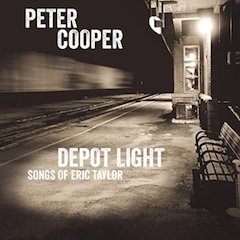
Peter Cooper: Ennobling Eric Taylor’s texts with emotional conviction that seizes you and won’t let go.

DEPOT LIGHT: SONGS OF ERIC TAYLOR
Peter Cooper
Red Beet Records
Hard-core Americana fans well know Eric Taylor’s songs and some may even know the Texas poet-songwriter himself. His first album was released to great acclaim in 1981 (four years after he won the Kerrville Folk Festival’s “New Folk” competition), but then he wasn’t heard from for another 14 years. His self-titled 1995 album caught Kerrville’s attention again, to the tune of being named Folk Festival Album of the Year. Once back in the game, Taylor stayed in the game, releasing new studio albums and a couple of live recordings steadily up to and through 2011.

Eric Taylor
From the time of his late ‘70s emergence at Kerrville, however, Eric Taylor has left another trail to explore—the one that leads directly to Texas contemporaries such as Steve Earle, Lyle Lovett, Townes Van Zandt, Nanci Griffith and others, all of whom have been affected and influenced by his literate, often mesmerizing songs probing the strata of relationships between desperate lovers, estranged fathers and sons, damaged outcasts in conflict with the natural world around them and such. The psychological depth of his writing has been compared by Ms. Griffith—who was once married to Taylor—to that of William Faulkner; others will hear echoes of Cormac McCarthy’s voice in his tunes’ expansive, austere, very southwestern settings and in his lyrics’ unembroidered voices hinting at a heightened awareness of how seemingly mundane encounters can loose sinister, uncontrollable forces capable of altering lives for good. There’s a reason Joan Baez speaks of Eric Taylor in hushed tones, and why a bedazzled Lyle Lovett was moved to produce some recordings for him.
Finally Peter Cooper, himself a gifted singer-songwriter becoming more impressive with each new recording (this is his fourth solo outing—“the Brett Favre of solo albums,” as he puts it in his liner notes), has given Eric Taylor the respect (and possibly higher profile) he deserves in an album’s worth of stunning tunes, insightfully rendered with complete understanding of the lyrics’ time, place and deepest emotions—especially those below the surface—while fashioning (as co-producer with Thomm Jutz) sonics designed to provide the narratives with distinctive aural backdrops suitable to the plotlines and locales.
‘Depot Light,’ the title track from Peter Cooper’s collection of Eric Taylor songs
Although nine other musicians provide Cooper support on his journey through Taylor’s singular universe, he spreads them out, keeping the tracks spare and evocative with his guitar and warm tenor voice backed by the subtlest of percussion touches (courtesy Pat McInerney) and soft bass lines (Mark Fain) with maybe only a violin (Andrea Zonn or, on “Prison Movie,” Justin Moses) and/or accordion (the estimable Joey Miskulin); sensitive, introspective piano (Jutz); or dobro/mandolin/banjo (Justin Moses again) in various combinations. Drums, by Lynn Williams, are present only on two songs; harmony vocals are courtesy Cooper’s formidable Red Beet partner Eric Brace and the crystalline-voiced Lindsay Hayes.
The understated backdrops and the expressiveness of Cooper’s singing focus a listener’s attention on the songs’ twists, turns and often surprising conclusions. It’s too bad the lyrics aren’t available with the CD, because they would make good reading. As per the Cormac McCarthey analogy, so much of the time as I followed Cooper’s voice through the content of Depot Light, as the stories went somewhere I couldn’t have predicted, I was reminded of how many of Taylor’s characters seem born of a line in the opening chapter of McCarthy’s No Country for Old Men, in which the sheriff is contemplating the misdeeds and unrepentant soul of a condemned man about to be executed. “The papers said it was a crime of passion and he told me there wasn’t no passion to it. … he told me had had been planning to kill somebody for about as long as he could remember. Said that if they turned him out he’d do it again. Said he knew he was going to hell.”
‘Louis Armstrong’s Broken Heart,’ from Depot Light: The Songs of Eric Taylor by Peter Cooper
Not that Depot Light is populated by stone-cold killers (there are a couple). What we find in Cooper’s choice of songs are men (mostly) that have accepted the way their lives have unfolded and that’s the way it is, or that’s the way they are, even as they make awkward stabs at finding inner peace (regardless of whether it comes at the expense of someone else’s feelings, or at the expense of reality).
In the soft shuffle of “Prison Movie” we learn the extremes of one man’s existence—“You learn how to cry in the cradle/and you learn how to lie in jail”—and what happened in between: he killed a man “who had a mouth too big for his face.” Then the McCarthy twist: “Just another white-trash cracker/livin’ on hate and shame/I only pulled the trigger, boys/the bullet was to blame…” There wasn’t no passion to it, folks. In “Carnival Jim & Jean” the narrator is far more embittered, caustic and delusional, stating to his lover at the outset, over the unsettled, thumping percussion and atmospheric guitars, “Ain’t nothin’ but a guitar, go ahead and play it/ain’t nothin’ but a high price, go ahead and pay it/ain’t nothin’ but a goodbye, go ahead and say it/you won’t do any better without me…” These are carnies, he “running this hustle to keep us fed/stacking up the milk bottles made out of lead/yeah, I’m a three-for-a-dollar son of a bitch/but you won’t do no better without me.” She—the child of an abusive mother–runs away, he can’t find her anywhere but he’s sure “she won’t do no better without me.” Nothing but dashed dreams and chutzpah here—life is a circus.
‘They say I always get like this when the weather’ bad’: ‘More Storms,’ from Depot Light: The Songs of Eric Taylor, by Peter Cooper
On June 13, 1977, at a Girl Scout camp outside Locust Grove, in Mayes County, Oklahoma, three scouts between the age of eight and 10 were raped, bludgeoned and strangled. After a near-year-long manhunt and a tip from a Cherokee medicine man, Gene Leroy Hart was arrested and charged with the murders. A full-blooded Cherokee and former Locust Grove High School football star, Hart was then an escaped convict serving 308 years in jail for kidnapping and raping two pregnant women and had also been convicted on four counts of first degree burglary. At trial he was acquitted of the Girl Scout murders but returned to prison to serve out his remaining 305 years, only to die shortly thereafter of a heart attack suffered while exercising in the prison yard one day. In researching a possible book about the case, former Mayes County Sheriff Pete Weaver, who was the first on the scene after the murders were reported and led the initial stages of the manhunt before the Oklahoma FBI moved in, granted me the only in-depth interview he had ever given about the case. During the course of our conversations at his home, Sheriff Weaver mentioned something that had never been part of the public record about the case: after Hart was captured and was being returned to prison, an electrical storm broke out. As the storm intensified, Weaver said, Hart became more agitated and finally violent to the point where he began slamming his head hard on the partition separating him from the officers in the front seat. Hart had to be restrained so he wouldn’t harm or kill himself.
‘Prison Movie,’ from Depot Light: The Songs of Eric Taylor, by Peter Cooper
I’m reminded of this by a beautiful song on Depot Light called “More Storms.” Seemingly a gentle acoustic ballad introduced by tender trills from Justin Moses’s mandolin, it seems to be a love song when the first verse unfolds: “Take a good look at the weather, friend/the two of you together standing in a crazy storm, southern bound/kill the lightnin’ ‘fore it hits the ground.” But he happens to be singing to a gal who’s taken her leave of him (“she’s solid gone”), and in the next verse Cooper softly muses, “gotta find a place where the weather’s fair…” before he repeats the loving chorus. Following another lyrical mandolin solo Cooper returns with the verse that changes everything and makes you realize we’re completely inside the head of a killer who has lost his grip on reality: “You know, sittin’ in the back seat, don’t feel right, boys/I’d rather take a cab/you’ve got these handcuffs much too tight/you know I get like this when the weather’s bad/they always say I get like this when the weather’s bad…” The script begs for Hitchcock’s direction to frame the shot of the conscience-free killer just so in order to emphasize evil so senseless and banal.
‘Carnival Jim & Jean,’ from Depot Light: The Songs of Eric Taylor, by Peter Cooper
In no less than three songs fathers and sons seek either each other or simply common ground, including in the elegiacal title track, so poignant and painful in Taylor’s acutely observed details of a lonely, barren life (swear I’ve heard that evocative, repeating fiddle riff in some George Strait song…); the poignant “Charlie Ray McWhite,” in which the son discovers dad on the skids; the soft but searing “The Great Divide,” a litany of boasts of inconsequential achievements in which the line “I’ve got a daddy/but he’s dead” kind of flies by until you realize it’s the substantive matter that adds a tragic dimension to the later boast of “I got another woman, just rocks me when I cry.”
‘All So Much Like Me,’ from Depot Light: The Songs of Eric Taylor, by Peter Cooper
As you can tell, words hardly do justice to the worlds Taylor creates in his songs but Cooper certainly does, both in his resolute tenor and in the way his measured readings ennoble the texts. His emotional conviction seizes you and won’t let go. The Great Plains-Big Sky endless horizon soundscape Cooper and Jutz create does its part in assuring a haunting experience that leaves a listener wanting more, so much more—from Eric Taylor as well as Peter Cooper.



